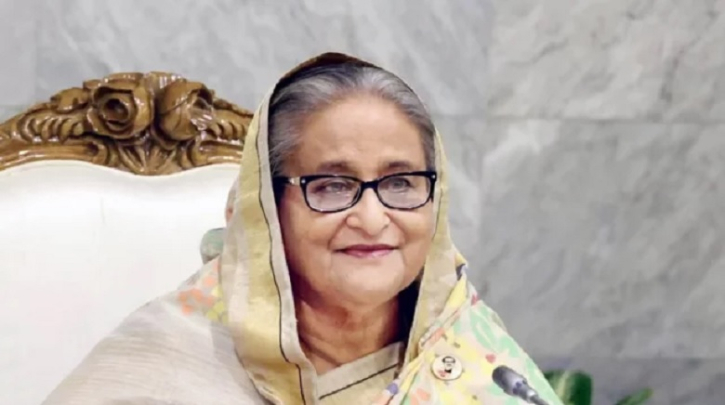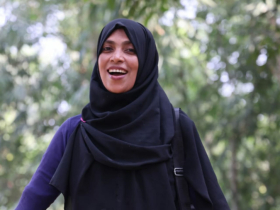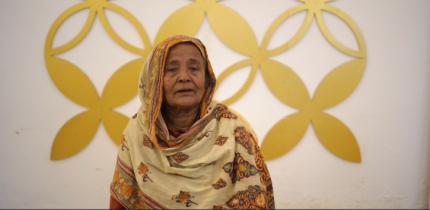
Photo: Collected
Prime Minister Sheikh Hasina has been honored with the 'Climate Mobility Champion Leader Award' in recognition of her global contribution as a voice of leadership in climate action and on behalf of people at risk of climate change. The award was presented by the International Organization for Migration (IOM) and the UN-backed Global Center for Climate Mobility.
From November 30 to December 12 this year, the United Nations Climate Conference 'Conference of the Parties 28' abbreviated as 'Cop28' was held in Dubai, United Arab Emirates. About 70 thousand participants including the top leaders of 198 countries participated in the conference, including the heads of state of 140 countries.
As Bangladesh is in the seventh position among the highly endangered and vulnerable countries due to climate change, the representatives of this country will play an important role in the climate mitigation and adaptation of this country and the whole world by playing an effective role in this conference and will ensure the necessary funds and technical support for the climate victims.
According to the promise, Bangladesh has to pay 100 billion USD every year to the developed countries. Green Climate Fund (GCF), Least Developed Countries Fund (LDCF), Adaptation Fund (AF), and GEF Trust Fund should be strengthened with adequate financing and access to those funds should be made faster and easier. To achieve the development, plan that Bangladesh has set to achieve the Sustainable Development Goals, we must collectively work to address climate change.
In a high-level panel session on the sidelines of the World Climate Conference-Cop 28 in Dubai, Information and Broadcasting Minister Dr. Hasan Mahmood received the award on behalf of the Prime Minister. The Information and Broadcasting Minister chief of the delegation of Bangladesh at COP-28. Hasan Mahmood presented the keynote at the high-level panel session on 'Mastering Climate Dynamics for Adaptation and Resilience'.
Pointing out that now is the right time to bring the issue of climate mobility into the mainstream of the global climate change discussion, the information minister said, "At the climate mobility summit of the 78th session of the United Nations General Assembly in September this year, Prime Minister Sheikh Hasina brought the issue of forced migration and displacement due to climate to the attention of world leaders." Before this, Bangladesh raised the issue in two dialogues organized with the cooperation of IOM in Dhaka and last year in Egypt's Sharm el-Sheikh Cop 27, said Hasan Mahmud.
At the same time, he highlighted various aspects of Bangladesh's initiatives led by Prime Minister Sheikh Hasina to face the challenges of climate change, including the construction of the world's largest multi-story social housing project to resettle 4,400 displaced families in Cox's Bazar.
"The Climate Mobility Champion Leader Award is a significant international recognition of Prime Minister Sheikh Hasina and the world's support for Bangladesh's continued leadership in addressing climate mobility and the challenges arising from it." Bangladesh is pleased that now a broad coalition of UN member states is working together on this issue. The award-winning Global Center for Climate Mobility works with the United Nations, regional intergovernmental organizations and development finance agencies to develop collaborative comprehensive solutions to address climate mobility. Climate change is a global crisis. Bangladesh is one of the most affected countries in the world due to climate change. Impact of climate change; For example, most vulnerable due to floods, cyclones, droughts, river erosions, tornadoes and inundation, salinity etc. This climate change is having a huge impact on the country's agriculture, infrastructure and lifestyle. The COP28 conference is one of the most important conferences held this year. In this conference, as always, the top leaders of the 198 countries that have signed the convention came together to make a united decision to deal with the harmful effects of climate change.
All member states of the United Nations and the European Union always meet in this conference as part of this convention. Bangladesh, which is at the forefront of climate change, participated in this year's climate conference to solve five critical issues together with the least developed countries and the most threatened and vulnerable countries due to climate change. At this year's conference, Bangladesh has set a target to work together on five key issues. Global stocks – The first issue on Bangladesh's agenda concerns the 'First Global Stocktaking', which is at the heart of this year's UN Climate Change Conference.
The Global Stocktaking is a process for countries and partners to see where they are collectively making progress towards meeting the goals of the Paris Climate Change Agreement, and where they are not. Loss and Damage Fund: The term loss and damage refers to the damage that countries, especially those most vulnerable to climate change, are affected by the climate crisis. The United Nations has explained it thus: 'Loss and damages arising from the adverse effects of climate change may include those related to extreme weather events. But slower events such as sea-level rise, rising temperatures, ocean acidification, glacial retreat and associated impacts, salinity, land and forest degradation, biodiversity loss, and desertification may also be included.'
Global Goals on Adaptation: The Global Goals on Adaptation GGA is a collective commitment under Article 7.1 of the Paris Agreement, which aims to 'enhance the world's adaptive capacity, strengthen resilience and reduce the risks of climate change.' Adaptation can handle political action and finance to the same degree as mitigation. At this year's Climate Conference, Bangladesh intends to work together with member countries to frame and formulate 'Global Adaptation Goals'. As well as countries at risk of climate change, Bangladesh will urge member countries to align their 2030 mitigation goals with the 1.5°C warming target stated in their Nationally Determined Contributions (NDCs) and increase funding to LDC countries. $100 billion in climate finance: Another important item on Dhaka's agenda is climate finance. According to the United Nations, climate finance refers to local, national, or transnational financing. Drawing from public, private, and alternative sources of financing, it seeks to support mitigation and adaptation actions that address climate change.
Doubling Adaptation Funding: One of the main agenda items at this year's climate conference is doubling adaptation funding. The Adaptation Fund finances projects and programs that help vulnerable communities in developing countries adapt to climate change. Initiatives are taken based on the country's needs, vision, and priorities. A long-awaited agreement on the Loss and Damage Fund was formally approved on the first day of COP28.
First, a fund will be created under the auspices of the World Bank, which will be able to distribute money to developing countries and rich industrialized countries, emerging economies, and fossil fuel-producing countries; For example, China, the Gulf countries, and the COP28 host country, the United Arab Emirates, will be funded. UN Secretary-General Antonio Guterres said at the COP28 climate conference that 2023 is set to be the hottest year on record in human history. "We are seeing the real picture of climate collapse before our eyes," Guterres said, imploring world leaders to act to stop climate change. A new paper released at the COP28 conference suggests that the use of fossil fuels will increase the severity of climate emergencies. The study, published in the journal Advances in Atmospheric Sciences, noted that large parts of Asia and much of the Americas could experience an exceptionally warm winter and gave a 95 percent chance that the global average surface temperature for the winter of 2023-24 would set a new historical record. According to the data of German Watch, Bangladesh is identified as the seventh climate-risk country in the world. Due to climate change, several changes have been observed in the past years; For example, continuous increase in temperature, irregular rainfall, occurrence of floods, rise in sea level, increase in the magnitude and intensity of cyclones, premature drought etc. However, a major problem in coastal areas is excessive salinity in soil and groundwater. Due to climate change and adverse human behavior, this salinity is increasing day by day and as a result, there is a lack of fresh water, lack of food production, displacement of people, lack of work etc.
At the same time, we suffer huge economic losses due to frequent cyclones and floods. In recent times, Bangladesh has been spending about five billion US dollars from the annual budget for climate management. However, only one billion dollars a year is coming from the international fund. In that case, adequate measures require several times more money than we have to work to get from the international fund. Not only that, to achieve the development plan that Bangladesh has set to achieve the Sustainable Development Goals, we have to work together to tackle climate change. Call for international support for the countries most affected by climate displacement and we need to address some of the issues of human mobility to protect them from facing future humanitarian crises.
Most climate displacement occurs within national borders and, in some extreme cases, across borders. International assistance and solidarity are needed for the most affected countries to prevent such a situation from becoming a humanitarian crisis. Those displaced or trapped by climate change need to have access to basic services, social protection, and livelihood options. Adverse impacts on their host communities also need to be addressed inclusively. It is estimated that climate change could displace 2160 million people worldwide by 2050, 40 million of them from South Asia alone. In Bangladesh, 20 percent of our population lives in coastal areas.
Rising sea levels, salinity intrusion, frequent floods, and severe cyclones make them vulnerable to forced displacement. Such displacement is happening faster than we think. Bangladesh's coastal district of Cox's Bazar has now sheltered 1.2 million Rohingya displaced from Myanmar. Some of these people fall victim to trafficking networks, which pose a security threat to the entire region. Such mixed migration flows make the issue of climate mobility even more problematic.
Bangladesh believes that the impact of climate change on human mobility should be high on the international agenda. Sheikh Hasina said Bangladesh is working together with IOM and other partners to highlight the need for an effective solution to the issue. We need to address climate impacts on human mobility in a rights-based manner consistent with the Global Compact for safe, orderly, and regular migration. Climate – The situation must be considered in the light of climate justice to find specific solutions in the context of migrant trauma and harm.
Local, national, and international levels must be prepared to see migration as a climate adaptation strategy, where it proves to be the best possible solution. Climate – Review existing international protection standards for the recovery of migrants, especially women, children, and other vulnerable groups. It should invest in better research data and evidence on the impact of climate change on human mobility to build a constructive position beyond narrow political considerations.
Hiren Pandit is a columnist and a researcher.

.png)







